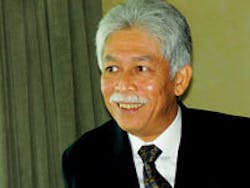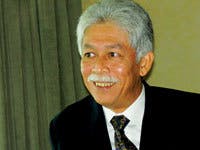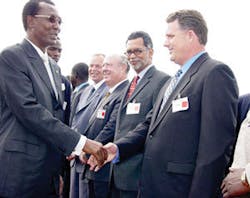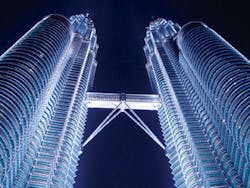Petronas balances domestic portfolio with an aggressive overseas strategy
An interview with Tan Sri Hassan Marican
EDITOR’S NOTE: The following interview was conducted with Tan Sri Dato Sri Mohd Hassan Marican, president and CEO of Malaysia’s Petronas by the editorial staff of Focus Reports LLC for Oil & Gas Financial Journal.
QUESTION: Most oil and gas companies produced outstanding results last year. How do you rate the financial performance of Petronas in 2004/2005 and what were the key growth areas when excluding the effect of the increased price of petroleum?
TAN SRI DATO SRI MOHD HASSAN MARICAN: The year ending March 2005 presented historic numbers both at revenue and earnings levels. Despite high oil prices we have done well in almost all sectors of our business. The contributions of the high oil prices are not as significant to us considering the integrated nature of our business. We have benefited from the strong growth of petrochemicals, refinery, and LNG businesses, for instance. This is very much in line with the value-adding strategy that we embarked upon 12 years ago, allowing us to globalize and to integrate our business. The results of that are now reflected in our good financial results. We will remain within the same strategy.
QUESTION : A former head of Sonatrach stated: « I never look at petroleum prices, I only manage the company. » Do you believe this statement can be sustainable in the current situation?
TAN SRI HASSAN MARICAN:Considering today’s environment, we definitely must consider the prices today and even more so the expected prices in the future. In planning projects, Petronas tends to use a conservative price estimate.
QUESTION: With only 19 years of petroleum and 33 years of gas reserves here in Malaysia, what are the criteria for E & P investments and what are your target regions for securing reserves?
TAN SRI HASSAN MARICAN: All multinational oil companies are competing for the few open areas of exploration and investment in the sector and naturally we face the same challenge. We keep focusing on Africa - that has been part of our strategy for several years now.
Photo courtesy of Esso Photo
Our policy to fuel upstream growth includes acquisition, operating ourselves, joint operation within a partnership, or even investing in partner-operated projects. We are a serious player with the position to participate with a significant percentage of the investment, meaning not less than 20-25%.
QUESTION: Currently 33% of Petronas reserves are located overseas. Is this percentage likely to increase in the near future?
TAN SRI HASSAN MARICAN: As a result of our increased commitment to overseas operations, it is likely that 50% of Petronas’ reserves and production will be located abroad in the near future, and foreign production will exceed the national production of Malaysia in two to three years time. In North Africa, for instance, we have developed a positive understanding about the environment and the geology over the past 15 years. Opportunities are plentiful there, and we see the region as the next hotspot for the industry.
QUESTION: The possibility that Petronas’ regional headquarters for Africa would be located in Sudan has recently been mentioned. . .
TAN SRI HASSAN MARICAN:Our largest investment outside of Malaysia in terms of both production and investment dollars is in Sudan where we employ in excess of 500 people. Therefore, while we may not have made an official announcement, it is only logical for our regional headquarters to be located there. It is also important to note that we dedicate a lot of resources to the development of the Sudanese petroleum industry by offering scholarships and university education for bright Sudanese students.
QUESTION: Petronas has recently signed a MOU with Petropars in Iran, which also includes third countries exploration. Why choose a partner with almost no overseas upstream experience?
TAN SRI HASSAN MARICAN: We may think that they have no international experience, but that same comment could have applied to Petronas 15 years ago. I firmly believe that an opportunity needs to be presented if there is sincerity, talent, and the desire to progress.
QUESTION: What is your “regional” E & P strategy? Are you satisfied with the level of cooperation with regional NOCs?
TAN SRI HASSAN MARICAN: Southeast Asia is naturally another area of primary interest for us. We have seen a lot of positive developments in the level of cooperation achieved with the national oil companies within the ASEAN region, particularly Vietnam, Indonesia, Thailand, and Myanmar. Our meaningful joint ventures are likely to increase progressively in scope. The region as a whole is more focused on the gas agenda, and Petronas has taken a leadership role in the construction of a trans-ASEAN gas pipeline system that will boost development in the region upon its completion in 2015.
QUESTION: Today LNG is the third-largest source of revenue for Petronas. What will be the future evolution of this division?
TAN SRI HASSAN MARICAN: We have been in the LNG business for more than 20 years and have grown from a 6 million ton capacity to close to 25 million tons today. Even though LNG is currently “the flavor of the month” and the competition is intense, there is a lot of room for continued expansion in our gas business. LNG may even become our second-leading source of revenue within the next few years.
Malaysia’s Bintulu LNG complex is the single largest and most impressive LNG complex in the world. The site is prepared for increased production and is positioned properly to accommodate the high demands coming mostly from Japan and Korea. At the moment we are de-bottlenecking MLNG Dua for a production increase of 1.5 million tons.
A factor that greatly enhances our international positioning in LNG is our ownership of MISC, the largest owner/operator of LNG tankers and the second-largest owner/operator of Aframax vessels in the world.
Internationally, Petronas made a considerable investment with British Gas in Egypt two years ago that gave us a 25-year LNG supply contract. We are quite satisfied with this relationship and are considering an additional investment subject to gas availability.
QUESTION: Did you take on the LNG projects in Egypt as an entry door to the European market?
TAN SRI HASSAN MARICAN: Europe as well as the USA are part of the next phase of our global LNG strategy. To that end, we have partnered with British Gas to build a re-gasification terminal in the UK. We have sold spot contracts to those markets before, but since we view LNG as a long-term business, our global plan is to structure supply contracts in a similar long-term manner.
We are also involved in an LNG project in Iran where we are currently in the FEED stage with our partner, TOTAL. Should we proceed, European markets and India will be the likely recipients of production.
QUESTION: How do you view LNG emerging customers such as China and India? What are your expectations?
TAN SRI HASSAN MARICAN: The Chinese and Indian markets may be the next big buyers of LNG. However, this process takes time and we are not going to rush and give up value in order to establish a premature presence since the LNG segment is a long-term business.
QUESTION: When the Qataris entered the LNG business a few years back with flexible spot or short term contracts, industry players thought that their actions would somehow ruin the parameters of the LNG business. What is Petronas’ position on LNG contractual terms?
TAN SRI HASSAN MARICAN: Flexibility in contracts is not a problem as long as it works both ways, involving both buyers and sellers. Also, there is a price to flexibility. We have been flexible in accommodating requests from our long-term buyers in Japan and Korea. At Petronas we believe LNG is a long-term business.
QUESTION: Downstream activities are the biggest profit center for Petronas. What does the future hold for this division? In terms of international investments, why was South Africa chosen in particular?
TAN SRI HASSAN MARICAN: Our investments in downstream operations will continue to be selective and in attractive markets. When we began the movement towards Africa, our targets areas were upstream in the north and downstream in the south. Our first international downstream was in South Africa, the most-developed economy on the continent in 1996, and we increased our stake in Engen Limited to 100% in 1998. Today, Engen holds a 28% market share in petrol stations, we own a refinery of white products, and pending regulatory approval, we are set to merge our South African operations with Sasol’s liquid fuels business. This move will position Petronas to further expand into neighboring countries.
In a regional context, we have downstream business in Thailand, Vietnam, China, and Indonesia. The Indonesian government’s liberalization of downstream activity in 2000 gave us a window of opportunity. Our first petrol fueling station in Indonesia is soon to be operating.
QUESTION: How do you evaluate Petronas’ capabilities in the petrochemical business?
TAN SRI HASSAN MARICAN:Our petrochemical business represents 10% of our revenues and reflects our value-adding strategy more than a volume-adding strategy. Our focus is ethylene and propylene-based products. Our strategy is to form joint ventures with the major petrochemical companies such as Dow Chemicals and BASF. We are able to learn through their specialized skills and technology.
QUESTION:There is a lot of discussion about a global lack of refining capacity. What do you think is the responsibility of companies such as Petronas to bring this capacity to the market?
TAN SRI HASSAN MARICAN: When we embarked on constructing our 200,000/bpd refining operations in Malacca during the mid 1990s, the critics questioned the investment due to the lower profit margins associated with refining at the time. Naturally the first few years were rather difficult, but we were aiming for the future and now everyone realizes that it was the right decision to make. We saw a growing demand and also felt the need to have a complex refinery in Malaysia as part of a plan for the future considering that eventually we would have to import foreign crude oil. Petronas also recently announced a joint venture refinery investment in Sudan with a 150,000/bpd capacity to add value to the crude that we produce there.
QUESTION: Building human capital has been identified as one of the main ingredients in Petronas’ success. Sometimes NOCs are known for not having competitive salary packages. How do you keep your local expertise in light of the much more generous offers coming from abroad?
TAN SRI HASSAN MARICAN:As a national company, we have to be competitive but we can’t be as overly generous as some multinationals. In a certain way we expect to lose professionals along the way as long we have enough talent to support our continued expansion. The question of human resources is an industry problem and it will continue to exist for some time to come.
Malaysia as a whole has “been discovered” as a supply source of human capital, and it is losing a lot of talent to the Middle East in all segments. Since the country’s independence there has been lot of investment in education. Today, our university is training about 400 foreign students from abroad who will form part of our talent pool of the future.
The success story of Petronas is the focus on capabilities in human capacity building. We spend a lot of time, money, and effort developing people. In fact, I spend no less then 20% of my time in human development.
QUESTION: Do you consider Petronas to be a national oil company (NOC) or an international oil company (IOC)?
TAN SRI HASSAN MARICAN: When the Malaysian government set up Petronas more than 30 years ago, we were established as a commercial entity that had to develop and chart its own course, even in Malaysia. Today, we are a national company that has grown out of its borders. Really, Petronas is a global company that happens to have its address in Malaysia.OGFJ



